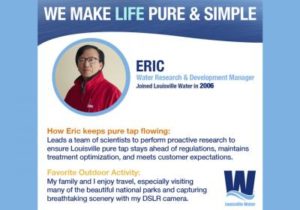 Louisville Water has focused on research since the early days of the company. For instance, in the late 1800s, George Warren Fuller began his landmark rapid sand filtration work. Charles Hermany then used Fuller’s design to install rapid sand filters at our Crescent Hill Water Treatment Plant.
Louisville Water has focused on research since the early days of the company. For instance, in the late 1800s, George Warren Fuller began his landmark rapid sand filtration work. Charles Hermany then used Fuller’s design to install rapid sand filters at our Crescent Hill Water Treatment Plant.
Today, Water Research & Development Manager Dr. Eric Zhu and his team help maintain this legacy by making sure the company stays on the forefront of water quality and treatment science.
“Under the strong leadership of the company and Water Quality Department, the research team actively evaluates current and future water quality regulations, studies potential water quality challenges, develops response strategies, and works with operations and engineering to enhance treatment processes,” Dr. Zhu said.
Examples of recent and current research include:
- Optimizing corrosion control treatment to ensure continued compliance with the Environmental Protection Agency’s Lead and Copper Rule
- Investigating a new chemical treatment strategy for enhancing water quality at both of our treatment plants and for maintaining disinfectant residuals in the distribution system
- Evaluating emerging contaminants and establishing a roadmap for addressing potential concerns in meeting future regulations and customer expectations
Dr. Zhu also collaborates with industry partners—including the EPA, the American Water Works Association, and the Water Research Foundation—to deal with critical water quality challenges.
He plays a leading role in national research on risk-benefit assessment to help Louisville Water and the water industry find opportunities to reduce overall health risks in drinking water treatment.
Like many Louisville Water employees, he has had to make some adjustments to the way he works during the past few months.
“The COVID-19 crisis certainly has some impact on how the research is being conducted,” he said. “I am currently not coming into the Crescent Hill facility every day since much of the desk-top research and collaboration with colleagues can be performed remotely.
At the same time, we have developed a phased approach to continue lab study under social-distancing conditions and ensure all our research projects can be completed safely and successfully.”

